Unit 01
四年级下册英语第一单元Unit1知识点总结
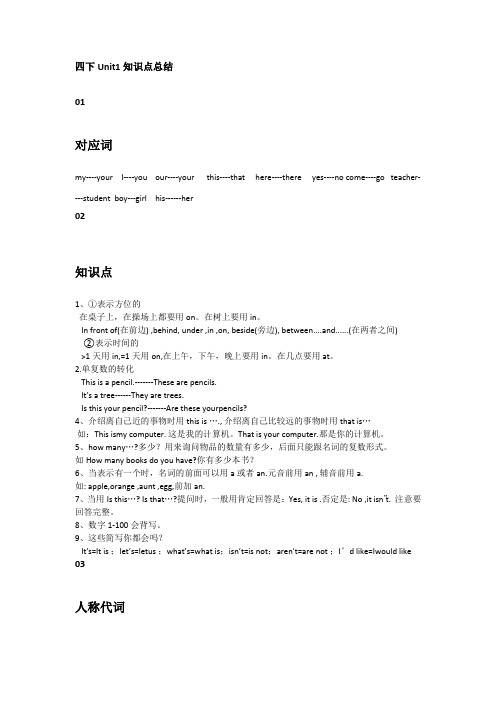
四下Unit1知识点总结01对应词my----your I----you our----your this----that here----there yes----no come----go teacher----student boy---girl his------her02知识点1、①表示方位的在桌子上,在操场上都要用on。
在树上要用in。
In front of(在前边) ,behind, under ,in ,on, beside(旁边), between....and......(在两者之间)②表示时间的>1天用in,=1天用on,在上午,下午,晚上要用in。
在几点要用 at。
2.单复数的转化This is a pencil.-------These are pencils.It’s a tree------They are trees.Is this your pencil?-------Are these yourpencils?4、介绍离自己近的事物时用this is …., 介绍离自己比较远的事物时用that is…如:This ismy computer. 这是我的计算机。
That is your computer.那是你的计算机。
5、how many…?多少?用来询问物品的数量有多少,后面只能跟名词的复数形式。
如How many books do you have?你有多少本书?6、当表示有一个时,名词的前面可以用a或者an.元音前用an , 辅音前用a.如: apple,orange ,aunt ,egg,前加an.7、当用Is this…? Is that…?提问时,一般用肯定回答是:Yes, it is .否定是: No ,it isn‟t. 注意要回答完整。
8、数字1-100会背写。
9、这些简写你都会吗?It's=It is ;let’s=letus;what’s=what is;isn’t=is not;aren't=are not ;I’d like=Iwould like 03人称代词。
苏教译林版九年级英语上册Unit 1 知识汇总

01Unit 1 单词eat up 吃光,吃完creative 有创造力的;创造性的curious 好奇的.energetic 精力充沛的.modest 谦虚的.organized 有条理的;有效率的.order 顺序keep... in order 使…保持井然有序show off 炫耀grammar 语法comeup with 想出(主意)neither 两者之一不nor 也不.neither...nor…既不…也不…accountant 会计born 天生的impress 给…留下印象.sculpture 雕塑,雕像praise 赞扬,表扬sales department 销售部general 总的;普遍的;首席的race 竞赛;赛跑.either…or…不是…就是…,或者…或者…lead 领先地位;榜样take the lead 处于领先地位fall behind 落后challenge 挑战.chief 主要的,首要的.high-speed 高速的.connect 连接connect to/with 与…相连,连接miss 错误,过失.as good as 和…几乎一样,简直是attention 注意,专心pay attention to 注意standard 标准pioneer 先锋,开拓者surgeon 外科大夫. carelessness 粗心、.extra 额外的;附加的devote 把…贡献,把…专用于respect 尊敬,尊重suitable 合适的;适宜的.partner 搭档,合作伙伴impatient 不耐烦的,急躁的.think twice 三思而行do the dishes 洗碗calendar 日历;挂历.animal sign 生肖represent 代表;象怔Appear 出现Fixed 固定的.cycle 循环.powerful 有力的;强大的.lively 活泼的;生气勃勃的.practical 实际的.loyal 忠诚的.in all 总共;总计star sign 星座.divide 分开,分divide…into…把…分成shape 使成形,塑造speech 演说,讲话,发言.monitor 班长.position 职位;位置;名次.agree with sb 同意(某人)看法02Unit 1知识梳理【重点短语】1.make sb do使某人做某事2.feel good 感觉好feel well 身体好3.well organized 很有条理4.people with different personalities 有不同品性的人5.keep sth in good order使...保持好的秩序6.show off炫耀7.patient enough足够耐心8.repeat sth for sb为某人重复 ..9.be curious about sth对..充满好奇e up with sth = think of sth想出...11.get angry easily容易生气12.a born artist一个天生的艺术家13.make a good accountant= be a good accountant 成为一个好的会计14.impress sb with sth用..给某人留下印象15.work without speaking all day long一整天不说话的工作16.win high praise 赢得高度表扬17.give up sth/give up doing sth 放弃某事 /做某事18.work for 为..工作19.day after day日复一日20.make sb unhappy使某人不高兴21.the general manger of .. 总经理的22.take the lead处于领先地位23.fall behind 落后24.take on new challenges接受新的挑战25.connect ...to/with 与..相连26.afford to do负担的起 ..27.pay attention to sth/doing sth注意..28.work to high standards向着高标准工作29.a pioneer heart surgeon心外科带头人30.can’t be too+形容词再 ..也不为过31.work extra hours 额外工作32.devote ...to sth /doing致力于...33.respect sb尊敬某人34.accept one’s advice 接受某人的建议35.neither...nor既不..也不36.either...or或者..或者37.not only...but also 不但..而且38.Chinese lunar calendar中国农历39.represent a lunar year代表阴历的一年40.the cycle of ..的循环【重点句型】1.Neither his parents nor he likes to show Off.他父母和他都不喜欢炫耀2. Li Ting can make a good teacher because she never gets angry easily.李婷能成为一个好老师因为她从不轻易生气3.My sister is well organized and she keeps everything in her bedroom in(good) order.我的姐姐很有条理,把她卧室里的一切都摆放的井然有序4. It's patient of you to explain grammar rules to us.你给我们解释语法规则真是有耐心5. He is creative enough to come up with all kinds of ideas.他创意十足,能够想出各种主意6. We are always taught/ told to share things with others.我们常被教育要和别人分享东西7. It's impossible for him to finish lunch in two minutes.对他来说,两分钟吃完午饭是不可能的8. To the doctors a miss is as good as a mile. They can't afford to make any mistakes.对医生们来说,失之毫厘,谬以千里。
八年级上册英语unit1知识点整理

八年级上册英语unit1知识点整理书籍好比一架梯子,它能引导我们登上知识的殿堂。
书籍如同一把钥匙,它能帮助我们开启心灵的智慧之窗。
下面给大家分享一些关于八年级上册英语unit1知识点整理,希望对大家有所帮助。
01Unit1单词anyone /'eniw?n/ pron.任何人anywhere /'eniwe?(r)/ adv.任何地方wonderful /'w?nd?fl/ adj.精彩的;绝妙的few/ fju:/adj.&pron.不多;很少quite a few相当多;不少(后接可数名词)most /m??st/ adj.,adv.&pron.最多;大多数something /'s?mθ??/ pron.某事;某物nothing (=not…anything) /'n?θ??/ pron.没有什么;没有一件东西everyone /'evriw?n/ pron.每人;人人;所有人of course /?vk?:s/ 当然;自然myself /ma?'self/ pron.我自己;我本人yourself /j?:'self/ pron.你自己;您自己hen /hen/ n.母鸡pig /p?g/n.猪seem /si:m/ vi.好像;似乎;看来bored /b?:d/ adj.厌倦的;烦闷的someone /'s?mw?n/ pron.某人diary /'da??ri/ n.日记;日记簿(keep a diary)activity /?k't?v?ti/ n.活动decide /d?'sa?d/ v.决定;选定(decide to do sth.)try /tra?/ v.尝试;设法;努力 (try to do sth. /try doing sth.)paragliding /'p?r?ɡla?d??/ n.空中滑翔跳伞feel like 给……的感觉;感受到bird /b?:d/ n.鸟bicycle /'ba?s?kl/ n.自行车;脚踏车building /'b?ld??/ n.建筑物;房子trader /'tre?d?(r)/ n.商人wonder /'w?nd?(r)/ v.想知道;琢磨difference /'d?fr?ns/ n.差别;差异top /t?p/ n.顶部;表面wait /we?t/ v.等待;等候(wait for)umbrella /?m'brel?/ n.伞;雨伞wet /wet/ adj.湿的;雨天的because of因为below /b?'l??/ prep.&adv.在……下面;到……下面enough /?'n?f/ adj.足够的(地)adv.充足的(地);充分的(地)hungry /'h??ɡri/ adj.饥饿的as /?z/ conj.像……一样;如同hill /h?l/ n.小山;山丘duck /d?k/ n.鸭dislike /d?s'la?k/v.&n.不喜爱(的事物);厌恶(的事物)Central Park 中央公园(美国纽约)HuangguoshuWarterfall /'w?:t?(r)f?:l/ 黄果树瀑布(贵州)HongKong /,h??'k??/,/'ha:?,ka:?/香港(中华人民共和国特别行政区)Malaysia /m?'le/马来西亚;Malaysian /m?'le??n/adj.马来西亚的;n.马来西亚人;Georgetown /?d??:d?ta?n/乔治市(马来西亚)Weld /weld/ Quay /ki:/ 海墘街Penang /p??n??/ Hill 槟城山(马来西亚)Tian'anmen Square /skwe?/,/skwer/天安门广场the Palace /?p?l?s/ Museum 故宫博物院Mark /mɑ:(r)k/马克(男名)02Unit1知识梳理Unit1. Where did you go on vacation?【重点短语】1. go on vacation 去度假2. stay at home 呆在家3. go to the mountains 上山/进山4. go to the beach 到海边去5. visit museums 参观博物馆6. go to the summer camp 去夏令营7. quite a few 相当多8. study for为…… 学习,9. go out 出去10. most of the time 大部分时间/绝大多数时间11. taste good 尝起来味道好12. have a good time 玩的开心13. of course 当然可以14. feel like 感觉像……/想要15. go shopping 去购物16. in the past 在过去17. walk around 绕……走18. too many 太多(可数名词前面)19. because of 因为20. one bowl of 一碗……21. find out 查出来/发现22. go on 继续23. take photos 照相24. something important 重要的事情25. up and down 上上下下26. come up 出来【重点句型】1. —Where did you go on vacation? 你到哪里去度假了?—I went to New York City. 我去了纽约城。
新目标八年级上学期英语测试unit1
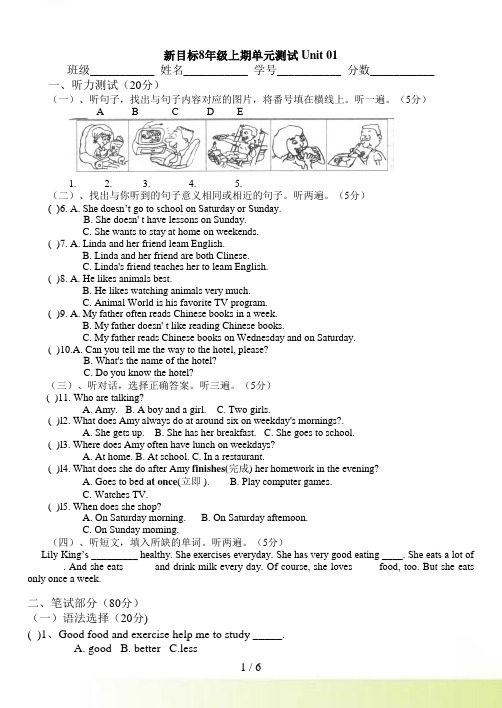
新目标8年级上期单元测试 Unit 01班级___________ 姓名___________ 学号___________ 分数___________一、听力测试(20分)(一)、听句子,找出与句子内容对应的图片,将番号填在横线上。
听一遍。
(5分)A B C D E1.____2._____3.______4.______5._______(二)、找出与你听到的句子意义相同或相近的句子。
听两遍。
(5分)( )6. A. She doesn’t go to school on Saturday or Sunday.B. She doesn' t have lessons on Sunday.C. She wants to stay at home on weekends.( )7. A. Linda and her friend leam English.B. Linda and her friend are both Clinese.C. Linda's friend teaches her to leam English.( )8. A. He likes animals best.B. He likes watching animals very much.C. Animal World is his favorite TV program.( )9. A. My father often reads Chinese books in a week.B. My father doesn' t like reading Chinese books.C. My father reads Chinese books on Wednesday and on Saturday.( )10.A. Can you tell me the way to the hotel, please?B. What's the name of the hotel?C. Do you know the hotel?(三)、听对话,选择正确答案。
英语课件-unit1

英语课件
UNIT 1—Working Together
01 Lead-in 02 Listening & Speaking 03 Reading & Writing 04 Language in Use 05 Problem Solving
Unit Goals
Learners should be able to understand the talk about workmates talk about co-workers' behaviors read about working with different people write about how to deal with difficult co-workers.
01 Lead-in Memo
Lead-in
The following is tina's memo - a list of things to do. Match the pictures with the persons she needs to call.
Memo ① 19 : 00 a.m. talk with co-workers(同事) about the working plan ② 11: 30 a.m. phone a client(客户) for the next meeting ③ 2: 10 p.m. ask the secretary (秘书) to print a report ④ 3: 00 p.m. give the technician (技师) a call about the computer
keep…in mind learn the ropes as often as possible have nothing to do with
大学英语自学教程上册unit怎样成为一名成功的语言学习者
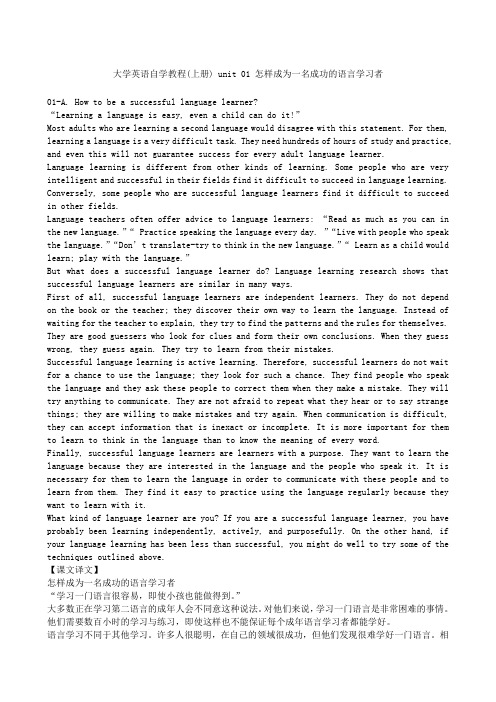
大学英语自学教程(上册) unit 01 怎样成为一名成功的语言学习者01-A. How to be a successful language learner?“Learning a language is easy, even a child can do it!”Most adults who are learning a second language would disagree with this statement. For them, learning a language is a very difficult task. They need hundreds of hours of study and practice, and even this will not guarantee success for every adult language learner.Language learning is different from other kinds of learning. Some people who are very intelligent and successful in their fields find it difficult to succeed in language learning. Conversely, some people who are successful language learners find it difficult to succeed in other fields.Language teachers often offer advice to language learners: “Read as much as you can in the new language.”“ Practice speaking the language every day. ”“Live with people who speak the language.”“Don’t translate-try to think in the new language.”“ Learn as a child would learn; play with the language.”But what does a successful language learner do? Language learning research shows that successful language learners are similar in many ways.First of all, successful language learners are independent learners. They do not depend on the book or the teacher; they discover their own way to learn the language. Instead of waiting for the teacher to explain, they try to find the patterns and the rules for themselves. They are good guessers who look for clues and form their own conclusions. When they guess wrong, they guess again. They try to learn from their mistakes.Successful language learning is active learning. Therefore, successful learners do not wait for a chance to use the language; they look for such a chance. They find people who speak the language and they ask these people to correct them when they make a mistake. They will try anything to communicate. They are not afraid to repeat what they hear or to say strange things; they are willing to make mistakes and try again. When communication is difficult, they can accept information that is inexact or incomplete. It is more important for them to learn to think in the language than to know the meaning of every word.Finally, successful language learners are learners with a purpose. They want to learn the language because they are interested in the language and the people who speak it. It is necessary for them to learn the language in order to communicate with these people and to learn from them. They find it easy to practice using the language regularly because they want to learn with it.What kind of language learner are you? If you are a successful language learner, you have probably been learning independently, actively, and purposefully. On the other hand, if your language learning has been less than successful, you might do well to try some of the techniques outlined above.【课文译文】怎样成为一名成功的语言学习者“学习一门语言很容易,即使小孩也能做得到。
小学英语三年级1-6课译文对照

Unit one Hello! 第1单元你好!Hello! I'm Zoom. 你好!我是Zoom!Hi! My name's Zip. 嗨!我的名字是Zip。
Hello! I'm Mike. 你好!我是迈克。
Hi, I'm Wu Yifan. 嗨,我是吴一凡。
Hello, I'm Chen Jie. 你好,我是陈杰。
What's your name? 你叫什么名字?My name's Sarah. 我的名字是萨拉。
Goodbye! 再见!Bye, Miss White! 再见,怀特小姐!Hello, I'm Miss White. 你好,我是怀特老师。
Hello, I'm Wu Yifan.你好,我是吴一凡。
Hi, I'm Sarah.你好,我是萨拉。
Let's learn学一学I have a ruler.我有一把尺子。
I have an eraser.我有一块橡皮。
ruler尺子pencil铅笔crayon蜡笔eraser橡皮Let's chant 说说唱唱I have a ruler. 我有一把尺子。
Me too!我也有!I have a pencil. 我有一支铅笔。
Me too! 我也有!I have a crayon.我有一支蜡笔。
Me too! 我也有!I have an eraser.我有一块橡皮。
Me too! 我也有!Let's talk 说一说Hello, I'm Mike. What's your name?你好,我叫麦克,你叫什么名字?My name's John.我叫约翰。
Goodbye!再见!Bye, Miss White.再见,怀特老师。
Zoom! Your bag! 祖姆!你的书包!Oh, no! 噢,不!bag书包pen钢笔pencil box铅笔盒book书Open your pencil box.打开你的铅笔盒。
六年级下册英语第一单元Unit1知识点总结

Unit1知识点总结01反义词或对应词heavy –light before –after easy –difficultsame –different early—late forget-rememberask---answer high---low teach—learn open-close02不规则动词过去式buy---bought think—thought bring—broughtteach---taught swim-swam go-went hit-hit find-found03现在分词hit-hitting sit-sitting run-running swim-swimming get-getting came- caming make-making dance-dancing write-writing注意:am/is /are+doing 表示正在做doing 问ing答4.will 或be going to +动词原形表示将来0104句子1. Ping-pong is my favourite sport. 乒乓球是我最喜欢的运动。
2.Of all sports, I like basketball best. 所有运动当中我最喜欢篮球。
3. Can you teach me to play basketball?你能教我打乒乓球吗?teach +谁(宾格)to +do4. I can learn to play basketball.我能学打篮球。
learn+to+doAre you ready to learn basketball? 你准备好学打乒乓球了吗?I can learn English. learn +物品I can learnthe song.5.Do you have any ping-pang balls?你有乒乓球吗?Do you have any T-shits?你有T恤吗?any 通常用在否定句和疑问句中。
(北师大版(三年级起点))小学英语三上 Unit 1单元测试01

Unit 1 Hello!单元测试听力部分一、听一听,选出你所听到的字母。
()1. B b A a C c()2. C c A a D d()3. D d B b A a()4. B b D d C c二、听一听,选出与所听内容相符的图片。
()1. A. B.()2. A. B.()3. A. B.()4. A. B.三、听一听,选出你所听到的句子。
()1. A. Hello! B. Hi!()2. A. Hi! I’m Ann. B. Hello! My name’s Ann.()3. A. What’s your name? B. Good morning!()4. A. Goodbye! B. Bye!()5. A. Good morning! B. Goodbye!笔试部分一、看图片,找朋友。
()1. A. dog()2. B. boy()3. C. ball()4. D. ant二、判断下列问答是(√)否(×)相符。
()1. —Good morning, children.—Goodbye!()2. —What’s your name?—My name’s Mocky.()3. —Hi! I’m David.—Hello! I’m Lily.三、一天上午,Ken 遇到Ann,请选择合适的选项补全对话。
A. I’mB. name’sC. What’sKen: Hi! My 1 Ken. 2 your name?Ann: 3 Ann.四、读一读,选一选。
A. Hello! I’m Ann.B. What’s your name?C. Goodbye!D. Hello!()1. —________—Bye!()2. —Hi!—________()3.—________—My name’s Ken.()4. —________—Hello! I’m Uncle Booky.五、连词成句。
新通用大学英语(1)unit01
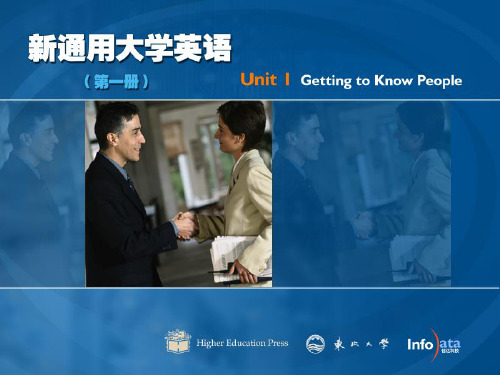
Part 3 Ask for Personal Information.
Listen to the conversations and fill in the missing information.
How Do You Spell Your Name?
Listen and write down the names you hear correctly.
a receptionist 3. Marie is _______________. a singer 4. Giorgio is _______________.
a travel agent 5. Bob is _______________.
Exercise B
Check whether each statement is True (T) or False (F).
Nice to meet you. Good to meet you.
Josh Given Name: _________
Last Name: Streep _________
Family Name/Surname: Groban _________ First Name: _________ Meryl
3
New Words Phrases and Expressions
3
Proper Names
Part 1 This Is My Teacher.
Listen and complete the following sentences.
A 1. The girl‟s mother calls her teacher ______. A. Mr. Mills B. Mr. Thomas C. Mr. Tom
2024新人教英语七上:Unit 1 单词精讲 课件
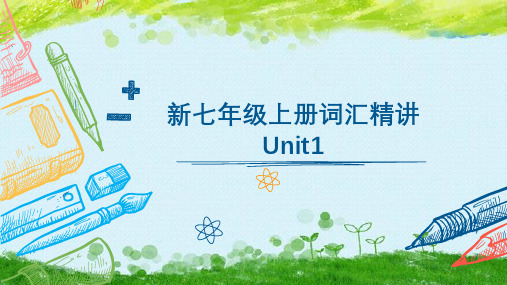
5. full/ fʊl /adj. 满的,满是……的;饱的;充实的; The glass was half full. 玻璃杯半满 必备搭配: ①full name全名 May I have your full name? 我能知道您的全名吗? ②be full of 充满 表示状态 be full of 通常可以和be filled with替换 The sky is full of stars. 满天星斗= The sky is filled with stars.
Tony made some kites, but __n__o_n_e__ of them could fly high in the sky. I have two sisters. They are __b_o__t_h__women teachers. Bill, Lucy and Lily are a__a_l_l____from Canada. Bill、Lucy和Lily都来自加拿大。
13. both/ bəʊθ / pron.两者 adj.两…,双… Both the women were French. 两名妇女都是法国人。 必备搭配:both…and… “两者都……” 主要用于强调“两者兼具”的特性。这个句型可以连接名词、代词、 动词、形容词、介词等,并且在连接两个名词作主语时,谓语动词 通常用复数形式 Both Lily and Wen are good at playing the violin. 莉莉和维恩都擅长拉小提琴
15. pot/ pɒt /n.锅;罐; 花盆;陶盆 复数:pots hot pot火锅
The pot is hot. Don't touch it. 这锅子很热,不要碰它。 I think it's time for hot pot! 我想现在是吃火锅的时间了! Let me see, how about hot pot? 我想想,吃火锅怎么样?
苏教译林版八年级英语上册Unit 1 知识汇总
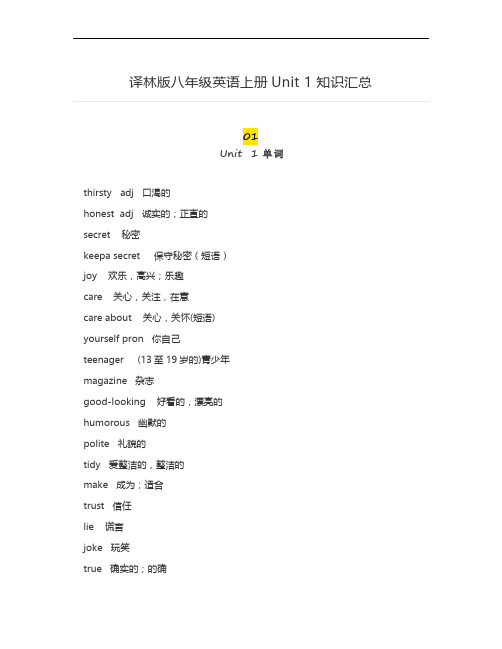
01Unit 1 单词thirsty adj 口渴的honest adj 诚实的;正直的secret 秘密keepa secret 保守秘密(短语)joy 欢乐,高兴;乐趣care 关心,关注,在意care about 关心,关怀(短语)yourself pron 你自己teenager (13至19岁的)青少年magazine 杂志good-looking 好看的,漂亮的humorous 幽默的polite 礼貌的tidy 爱整洁的,整洁的make 成为;适合trust 信任lie 谎言joke 玩笑true 确实的;的确generous 慷慨的,大方的willing 乐意的,愿意的anytime 在任何时候(短语) voice 嗓音singer 歌手almost 几乎,差不多round 圆形的sense 感觉;观念,意识humour 幽默(英)bored 无聊的fit 可容纳,装进knock 碰,撞;把...撞击成onto prep 到…的上面straight 笔直的sweet 可爱的,惹人喜爱的smile 微笑personality 个性choose 选择;挑选worse 更差,更糟,更坏worst 最差,最糟,最坏height 高,高度weight 重量sec 秒competition 竞赛,比赛;竞争test 测试,考察swimmer 游泳者plan 打算,计划social 社会的socialworker 社会工作者ponytail 马尾辫shy 害羞的square 方形的smiling 微笑的,带着笑意的handsome 英俊的fat 胖的hard-working 勤奋的,工作努力的patient 耐心的smile 微笑unhappy 不快乐的,悲伤的excellent 杰出的,极好02Unit 1知识梳理Unit 1 Friends重点短语:1.一个诚实的男孩 an honest boy2.一个八年级的学生 a Grade 8 student3.一次写作比赛 a writing competition4.一则……的广告 an advertisement for5.保密 keep secrets6.使我开心 make me happy7.分享我的快乐 share my joy8.遇到麻烦 be in trouble9.和我一样苗条 as slim as me10.一个我最好的朋友 one of my best friends11.对……慷慨 be generous to12.乐意做某事 be willing/ ready to do13.给需要的人让座 give seats to people inneed14.环游世界 travel around the world15.使他看起来聪明 make him look smart16.感到无聊 feel bored17.讲滑稽的笑话 tell funny jokes18.走过课桌 walk past the desk19.撞翻我的书 knock over my books20.想起我的好朋友 think of my good friends21.看一则广告 read an advertisement22.一位忠实的朋友 an honest friend23.及肩的头发 shoulder-length hair24.做大量的电脑工作 do much computer work25.投票赞成某人 vote for sb.26.帮助有需要的人 help people in need27.课外活动 after-school activities28.尽力帮助他们 try to help them29.一名社会工作者 a social worker30.未来计划 future plans31.看起来爱好运动 look sporty32.搬迁到北京 move to Beijng33.过来 come over34.想念我的老同学 miss my old classmates35.与……交朋友 make friends with36.给我一些忠告 give my some advice37.住在隔壁 live next door38.邀请某人做某事 invite sb to do39.她微笑的眼睛 her smiling eyes40.面带微笑 wear a smile on one’s face41.再来一些饮料 some more drinks42.一些喝的 something to drink43.任何时间 at any time44.在将来 in the future45.对……很了解 know sth. very well46.一个人坐着 sit alone47.认识某人 get to know sb.48.不如 not as… as49.在做某事上有困难 have problems doing sth.50.在某事上有困难 have problems with sth.51.适合某事 be suitable for52.和某人分享某物 share sth with sb53.对某人友好 be friendly to sb54.十年前 ten years ago55.解出数学题 solve the maths problem56.写信给某人 write to sb57.说某人的坏话 say a bad word about sb58.相信他说的话 believe what he said/ hiswords59.倾听人们的难题 listen to people’s problems60.帮助人们解决难题 help people solve theirproblems61.因为……而出名 be famous for62.作为……而出名 be famous as63.个像艾伦那样的朋友 have a friend like Alan64.在午餐期间 during lunch time65.同意做某事 agree to do66.同意某人的意见 agree with sb67.在左边的那个男孩 the boy on the left68.跑步最快的人 the fastest runner69.A和B都 both A and B重点句型:1.冰箱里没有别的东西。
新通用大学英语综合教程2(第2册)U1课后答案及课件(第一单元unit01),高等教育出版社
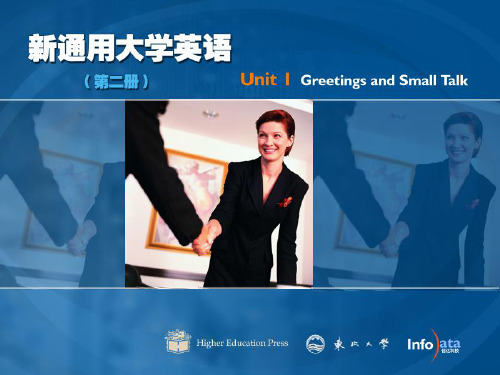
—divorced —married —single
Part 4 Ways of Greetings in Southeast Asian Countries
Check whether each statement is true (T) or false (F).
True False
1. Indonesians tend to greet each other in a quick way.
5. Bruneians like to have a firm handshake.
□□ □□
Part 5 Recognition
You will hear a conversation between a man and a woman. The woman thinks she knows the man, so she starts a conversation. Listen to the recording and briefly answer the questions below.
Part 2 Ask About a Person’s Experiences
Listen to the game Once in a Lifetime. Check if the contestants answered
yes (Y) or no (N) to the host’s questions.
6. visited Chicago?
□ □ □□
Have you ever…?
Part 3 Introduction
You will hear two conversations in which two people are introduced to new friends. The first person is called Kate and the second person is named Kathy. Listen to the recording and tick the information you hear about these two people.
五年级下册英语第一单元Unit1知识点总结

五四青年节01短语go toBeijing 去北京at the train station 在火车站want to 想要sit down 坐下stand up 起立go straight 直走ride bike 骑车look out of 向外看on the train在火车look at 看见draw a picture 画画read a book读书sing a song 唱歌have breakfast吃早点fly a kite 放风筝here you are 给你read thenewspaper 读报havefun 玩得高兴play with 跟…玩play cards 打牌go on atrip to Beijing去北京旅行get the tickets 买票how much 多少钱have a good trip一次美妙的旅行listen to music 听音乐02句子1.Please don‘t jump!不要跳2.A:What are you doing ?你在干什么?B:I’mreading a book.我正在读书。
3.A:Who is singing ?谁在唱歌?B:Thegirl is singing。
这个女孩在唱歌。
4.A:Who is hungry ?谁饿了?B:I’mhungry.我饿了。
5.A:Would you like some fruit? 你想要点水果吗?B:Yes,please/No,thanks.6.A:What would you like? 你想要点什么?B:I’d like some candy.我想要点糖果。
7. A:What is the baby doing ?这个婴儿在干什么?B:The baby is crying.这个婴儿在哭。
03语法1.完全形式don’t -do not 、I'm-I am、isn't-is not、can't-can not2.单三run-runs 、say-says3.there同音词their look看的动作see看的结果4.现在分词:do-doing、look-looking、draw-drawing、sing-singing、sit-sitting、play-playing、talk-talking 、sleep-sleeping、have-having、drive-driving5.反义词:ask-answer、man-woman、sit down-stand up、tall-short、these-those6.Please don't +动词原形请不要做(祈使句否定形式)7.主语+am/is/are+ 现在分词现在进行时(正在做……)一般疑问句:Am/Is/Are 主语+现在分词?。
4000基础英语词汇背诵Unit1
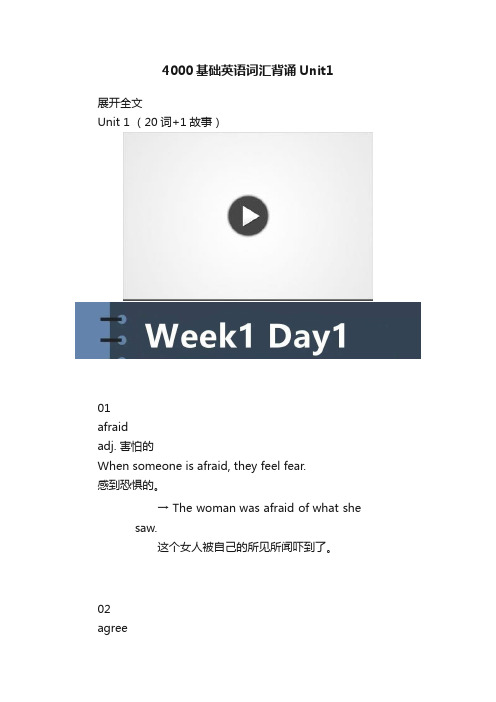
4000基础英语词汇背诵Unit1展开全文Unit 1 (20词+1故事)01afraidadj. 害怕的When someone is afraid, they feel fear.感到恐惧的。
→ The woman was afraid of what she saw.这个女人被自己的所见所闻吓到了。
02agreev. 同意To agree is to say 'yes' or to think the same way.表示赞同或想法一致。
→ A: The food is very good in thatrestaurant. B: I agree with you.A: 这家餐厅的食物真不错。
B:我也这么觉得。
03angryadj. 生气的When someone is angry, they may want to speak loudly or fight.人生气时可能会想大声说话或打架。
→ She didn't do her homework, so herfather is angry.她没做作业,这可把她爸爸气坏了。
04arrivev.到达To arrive is to get to or reach some place.去到或来到某个地方。
→ The bus always arrives at the cornerof my street at 4:00.班车通常在4点就到街角了。
05attackv. 攻击To attack is to try to fight or to hurt.意图打架或伤害。
→ The man with the sword attacked the other man first.拿剑的人先动的手。
06bottomn. 底部The bottom is the lowest part.最低的地方。
→ The bottom of my shoe has a hole in it.我鞋底磨了个洞。
《新编大学英语综合教程(上册)》unit1

How are you getting on with (1c)o_ll_e_g__e_l_i_fe, Lucy?
I frequently feel very (2) ______l_o_n__e_ly__. Before I came I was really (3) _____e_x_c_i_t_e_d_. I dreamed of living (4) ______o__n__m. Byuotwn now that I’m totally on my own, I feel homesick.
C. For 5 years at most.
D. For 50 years at least.
A 3. What did the woman plan to do?
A. To see a play. B. To go shopping.
C. To watch TV.
D. To read book.
01
Listening
Ⅰ Lead-in
Listening
Look at the pictures of the dormitory items and match them with the names.
A
B
C
D
1. wardrobe
2. water machine
B
E
E
F
3. dormitory furniture set
B. often goes to the library C. is from the Art Department
B 2. They meet each other in the ________.
Unit 1 单元知识点总结课件--八年级英语下册(人教版)

02 作表语
描述身体/精神状态或感觉
常放be, feel, seem, look…后
You can be yourself.
03 作同位语
强调作用, 常作主语或宾语 的同位语, 表示“亲自,本人” The story itself is good. .
02
(die- died- died- dying)
She died 2 years ago.
04 dying adj. 垂死的,要死的
This is a dying bird.
2.7 risk
n. 危险,风险
the risk of … …的风险 Staying up will increase the risk of the illness.
lie down and rest / shouldn’t eat so much next time
④ have a toothache
see a dentist and get an X-ray
⑤ have a fever
take one’s temperature
⑥ have a headache
Words
matter, lie, enough, mean…
2.1 matter
n. 问题,事情
-- What’s the matter with you? -- I hurt my leg.
v. 要紧,有关系
It doesn’t matter.
2.2 enough
位置:前形副后
adj. 足够的,充足的 enough + n I have enough money.
Unit 1 What's the matter?人教版八年级下册复习课件

单词过过过
Ⅱ.用所给单词的适当形式填空
6.At present there are many online courses and we can choose some to study by _ou_r_s_el_v_es__(we).
7.In 1887, a mountain _c_l_im_b_e_r__(climb) found large footprints(脚 印) in the snow.
单词过过过
14.My mother helped me move the heavy box _o_n_t_o____(向) the desk.
15.To my _su_r_p_ri_se___(惊奇), Jane was a mother of two children. 16.All thepa_s_se_n_g_er_s__(乘客) on the fight 3U 8633 feel very thankful
23.n.绷带 v.用绷带包扎_b_a_n_d_a_g_e_ 24.v压;挤;按__p_re_s_s___ 25.adj.生病的;有病的___si_c_k___ 26.n.膝;膝盖__k_n_e_e___ 27.n.鼻出血_n_o_s_e_b_le_e_d 28.v呼吸__b_re_a_th_e__ 29.adj.晒伤的_s_un_b_u_r_ne_d_ 30.pron.(we的反身代词)我们自己_o_u_rs_e_lv_e_s_
单词过过过
31.n.登山者;攀登者_c_li_m_b_e_r __ 32.n.&v.危险;风险;冒险__r_is_k____
33.n.(交通)事故__a_cc_id_e_n_t_ 34.n.情况;状况__si_tu_a_ti_o_n_ 35.n.千克;公斤___ki_lo____ 36.n.岩石__ro_c_k____ 37.n.(pl.knives)刀___k_n_ife___ 38.n.血__b_lo_o_d___ 39.v意思是;打算;意欲__m__e_an___ 40.n.重要性;重要_im_p_o_r_ta_n_c_e
- 1、下载文档前请自行甄别文档内容的完整性,平台不提供额外的编辑、内容补充、找答案等附加服务。
- 2、"仅部分预览"的文档,不可在线预览部分如存在完整性等问题,可反馈申请退款(可完整预览的文档不适用该条件!)。
- 3、如文档侵犯您的权益,请联系客服反馈,我们会尽快为您处理(人工客服工作时间:9:00-18:30)。
Historical Background
(3) King Alfred the Great: In 871, Ethelred of Wessex is defeated by Danish forces January 4 at Reading, gains a brilliant victory 4 days later at Ashdown, is defeated January 22 at Basing, triumphs again March 2 at Marton in Wiltshire, but dies in April. His brother, 22, pays tribute to the Danes but will reign until 899 and be called Alfred the Great.
Unit 1
The Anglo-Saxon Period
The Anglo-Saxon Period
I.
Historical Background II. Anglo-Saxon Poetry III. Anglo-Saxon Prose
I. Historical Background
Beowulf
Beowulf is a long verse narrative on the theme of ―arms and man‖ and as such belongs to the tradition of a national epic in European literature that can be traced back to Homer’s Iliad and Virgil’s Aeneid.
Historical Background
(5) the Norman Conquest in 1066
The Norman Conquest
Historical Background
(6) Augustine:
St.
Italian-born missionary and prelate who introduced Christianity to southern Britain 597 and was ordained as the first archbishop of Canterbury 598. Died c 604.
Historical Background
Originally the name Anglo-Saxon denotes two of the three Germanic tribes --- Angles, Saxons and Jutes -- who in the middle of the 5th century left their homes on the shores of the North Sea and the Baltic to conquer and colonize distant Britain. They lived in the northern top of Germany and the southern part of Denmark at that time.
Historical Background
During the invasion these aborigines Celts withdrew to the Welsh and Scottish mountains and left a great part of England to the Romans. Not until the 5th century did the Romans withdrew. England had been made a Roman Province since 80 AD. As the Roman legions withdrew, the Celts came back.
King Alfred the Great
Historical Background
(4)
Canute (994?-1035):
King of England (1016-1035), Denmark (1018-1035), and Norway (1028-1035) whose reign, at first brutal, was later marked by wisdom and temperance. He is the subject of many legends.
Historical Background
Important historical events:
(1) Heptarchy:
The informal confederation of the Anglo-Saxon kingdoms from the fifth to the ninth century, consisting of Kent, Sussex, Wessex, Essex, Northumbria, East Anglia, and Mercia.
Beowulf
The somber story is told in vigorous, picturesque language, with heavy use of metaphor; a famous example is the term ―whale-road‖ for sea. The poem tells of a hero, a Scandinavian prince named Beowulf, who rids the Danes of the monster Grendel, half man and half fiend, and Grendel's mother, who comes that evening to avenge Grendel's death. Fifty years later Beowulf, now king of his native land, fights a dragon who has devastated his people. Both Beowulf and the dragon are mortally wounded in the fight. The poem ends with Beowulf's funeral as his mourners chant his epitaph.
Beowulf
(Subtitles of the Excerpt) III Beowulf’s departure for Denmark VI Beowulf’s speech upon his arrival in Denmark X The eve of the battle XI The battle with Grendal XII Beowulf’s victory XLIII Beowulf’s funeral and his people’s eulogy of him
Historical Background
(2) the Vikings invasion:
Vikings, collective designation of Nordic people— Danes, Swedes, Norwegians— who explored abroad during a period of dynamic Scandinavian expansion from about AD 800 to 1100. Land shortage, improved iron production, and the need for new markets probably all played a part in Viking expansion. The Viking Age is commonly associated with unbridled piracy, but not every Scandinavian was a professional warrior or Viking, and not every Viking was a pirate.
The English people are a complicated race. The first inhabitants of the island were commonly known as the Celts (or Kelts). 55 BC saw the invasion of the island headed by Julius Caesar.
II. Anglo-Saxon Poetry
Beowulf --the national epic
1.
Beowulf
Beowulf, an Anglo-Saxon epic poem, the most important work of Old English literature (see English Language). The earliest surviving manuscript is in the British Library; it is written in the West Saxon dialect and is believed to date from the late 10th century. On the basis of this text, Beowulf is generally considered to be the work of an anonymous 8th-century Anglian poet who fused Scandinavian history and pagan mythology with Christian elements.
